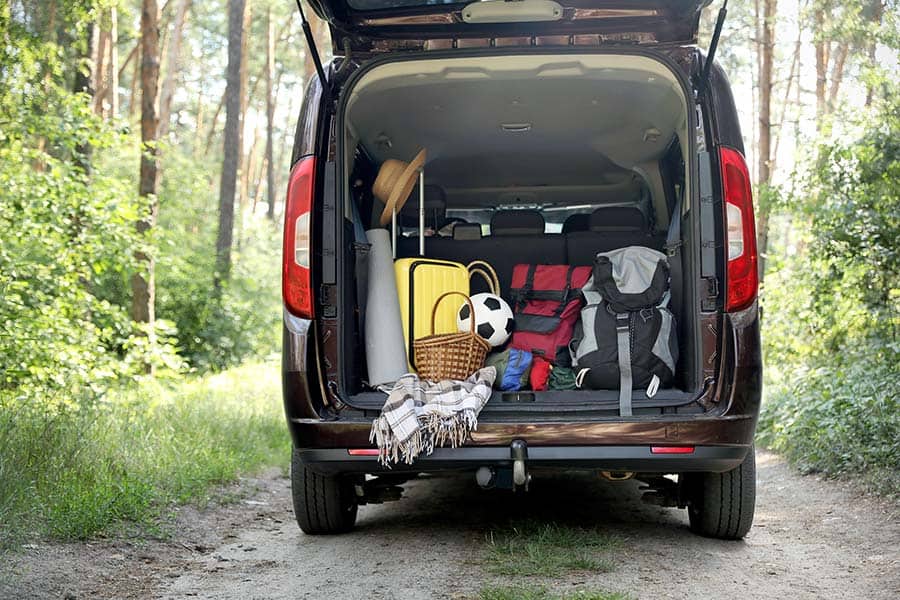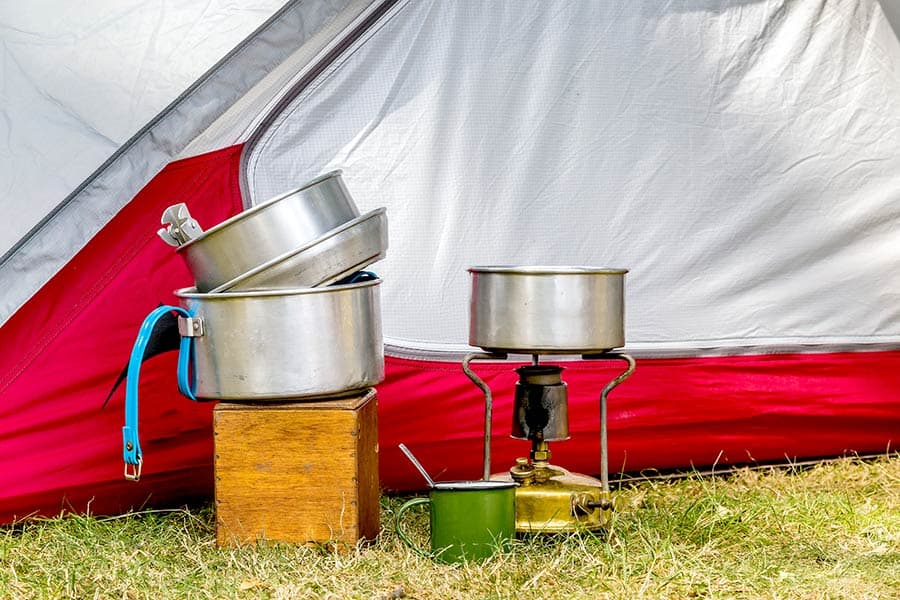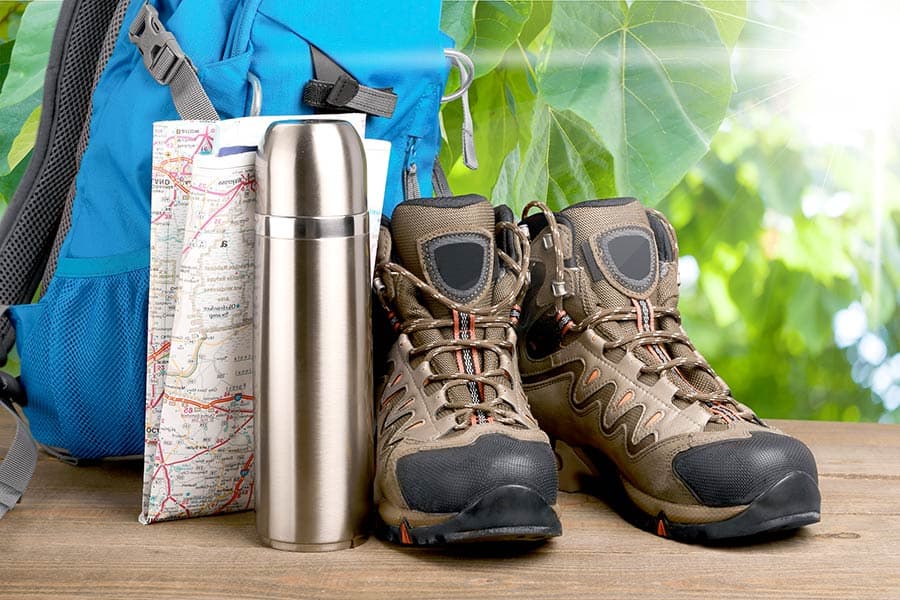
One of the most long-awaited parts of camping is finally loading up your car or van with your camping supplies. The problem is that you might be under the impression that it’s better to pack too much rather than pack too little. Preparedness is key, but overpacking can weigh your journey down.
The weight of your camping gear depends entirely on how much gear you bring. Food and water weigh the most at about 10 pounds total per person, per day. Tents, tools, and cooking tools are usually less than 10 pounds each.
What you bring is just as important as how much it weighs. So, let’s go over why weight is important in the first place. Then, we’ll review how much camping gear really weighs and how this compares to what your vehicle can actually support.
Why Weight Matters
You might assume that, as long as you can fit your gear into your car, then it’s safe to drive with. But just because you can fit all of your camping gear into your vehicle doesn’t mean that you should. In fact, how much your camping gear weighs is much more important than how large it is.
That’s because overpacking your vehicle could cause damage to your car or van. Not only does this mean a trip to the auto repair shop, but it also means less funding for your next road trip or camping adventure.
Let’s talk about why it’s important to pack light.
Tire Damage
All tires have something called a “maximum load.” As long as your car’s tires are inflated as recommended, your vehicle should be able to support this maximum load without damaging your tires.
The problem occurs when you exceed this maximum load for all four tires.
When this occurs, you might experience a tire blowout. Instead of a slow leak like when a nail is in your tire, a tire blowout is a sudden loss of air – it might even seem like it explodes. Not only can this cause serious injuries, but it also means replacing your tire.
Replacing a tire can cost you an extra $50 to $350 depending on the tires your vehicle uses. If your car somehow handles the extra load without a blowout, then you’re more than likely heading toward worn treads instead.
Worn treads leave your tires “bald,” which puts you at risk for lack of traction on wet and dry roads. Steering might be more difficult, and stopping on a dime is no longer in the cards. Bald tires increase your risk of an accident in practically every situation.
You have two options to protect your tires: Invest in heavy-duty tires that can handle a heavier load or pack lighter when you go camping.
Engine Wear
The more weight you place in your car or van, the harder the engine has to work to keep the vehicle moving forward. The problem is that overworking your engine can cause internal parts to wear faster, especially at high speed, excessive loads, and high temperatures.
What’s worse is that fixing an engine is not easy or inexpensive.
Depending on the make of the vehicle you have, and how many parts you need to replace, you’ll probably be shelling out between $1,000 to $10,000 for a rebuild or a new engine.
Not only that, loading up your car or truck with too much camping gear also puts excess strain on nearly every other part of the vehicle. That includes the suspension, the axles, and even your brakes.
Fuel Efficiency
When your engine and other major parts are under excess strain, fuel efficiency goes out the window. Your car needs to use much more gasoline or diesel to continue carrying the load that you’ve packed.
Fuel efficiency is most harmful to your wallet.
Even losing 5 miles per gallon on a 13-gallon tank is 65 fewer miles that you can drive on a single tank. This decreased fuel efficiency adds up for long road trips where you’re refilling the gas tank several times while en route.
The best way to limit your stops at gas stations and save money is to pack your vehicle as minimally as possible. You can check out this useful calculator to compare how fuel economy impacts finances.
Keeping Visibility
Perhaps most important is how much space you’re taking up when you pack your vehicle for a camping trip. You might think it’s a good idea to fill it to the brim, but that can be extremely dangerous when driving.
For example, you might end up reducing your field of vision.
The more you pack into your backseat or even in the bed of your pickup truck, the less you can see when you’re on the road. It’s crucial that you pack your vehicle so that you can see through each window and mirror without issue.
Also, every passenger in your vehicle should be able to fit comfortably.
Allowable Weights of Vehicles
Now that you know why your camping gear’s weight is so important, you need to figure out how much your type of vehicle can carry without damaging your vehicle (and your wallet).
Here’s a look at maximum allowable weights (load capacity) by vehicle type:
- Mid-sized sedans: Approximately 850 pounds
- Sports cars: Approximately 450 pounds
- Minivans: Approximately 1,115 pounds
- SUVs: Approximately 1,100 pounds
- RVs: Approximately 3,000+ pounds
Note: These are just approximate values.
You must know precisely how much your vehicle can support safely while on your camping trip. Knowing the weight you can carry, can help you keep your family safe and focus on bringing the absolute necessities on your next trip.
Remember that exceeding this limit can be dangerous and costly.
Other Posts of Interest
- The Cost Of Converting A Sprinter Van Explained
- Internet While Camping: 8 Ways to Get Wi-Fi
- Are Camping Fridges Worth It? These Ones Are!
- How To Pack A 4×4 For Camping: A Comprehensive Guide
Common Gear & What It Weighs
You probably think of camping gear in terms of what you can squeeze into your car rather than how much it weighs. Now that we know the weight is just as important, you need to consider how much you’re packing and what your vehicle can handle.
Let’s talk about the different types of camping gear and supplies that you would commonly pack and what it weighs.
Food
If you’re not basing all of your camping meals around fish that you plan on catching, then you need to be packing at least a few days worth of food and beverages for each member of your family. You also need a way to cook your food while in the wild.
The rule of thumb is to pack about 1-½ to 2-½ pounds of food a day for each person.
Averaging that range out to 2 pounds a day, here’s a look at how much food to pack per person. Multiply these values by the number of people on your trip:
- One day: 2 pounds
- Two days: 4 pounds
- Three days: 6 pounds
- Four days: 8 pounds
- Five days: 10 pounds
- Six days: 12 pounds
- Seven days: 14 pounds
If you have a large camping party and not much room (or weight left) in your vehicle, it’s a good idea to focus on bringing lightweight foods instead. That includes snacks like crackers, protein bars, nuts, and seeds.
Catching fish for dinner means less you have to pack too.
Water
Beverages are more critical, yet they also weigh a good deal more than most foods.
If you’re stocking up on gallons of water, you’re looking at about 8 pounds per gallon.
Since each person should have a gallon of water each day, you might be loading up your car with 56 extra pounds per person, per week of your trip.
A decent way to avoid this additional weight is by choosing a campsite with freshwater access. You can fill up a lightweight, reusable water bottle instead of buying individual gallons of water. Having freshwater access will save you a ton of money too.

Cooking Gear
You also have to think about how you plan to cook your food once you get to your campsite. Tiny backpacking stoves weigh in around 3 ounces, and a single burner camping stove that can cook up one or two burgers at a time might weigh as little as 2-1/2 pounds.
A 2 burner camping stove with more cooking space (so you can cook more at a time) can weigh around 10 pounds or more depending on the model and take up a larger amount of space.
When your favorite camping meals include scrambled eggs or pasta, you’ll want to invest in pots and pans. The good news is that these items usually don’t weigh all that much – they’re typically less than 2 pounds each.
Just remember that cookware takes up a lot of space.
Tents
A camping trip doesn’t exist without something to sleep on at night. You have plenty of different options when it comes to planning sleeping arrangements.
The general rule of thumb is that your tent should weigh about 2 to 3 pounds per person.
That means a 2-person tent should weigh up to 6 pounds, and a 4-person tent should weigh up to 12 pounds. Based on this, you don’t have to worry about your tent breaking the maximum load that your vehicle can carry.
The tarp you lay below your tent to keep bugs and water out will only weigh about 2 pounds maximum.
Sleeping Supplies
What you’re sleeping on is another weight you have to consider.
Most campers will opt for a sleeping bag. These take up more space than anything but usually don’t weigh all that much (they’re mostly cushion and fabric). Even the thickest sleeping bags built for winter camping will weigh less than 8 pounds.
If even the thought of sleeping on the ground makes your back hurt, then an air mattress might be more your speed. Including the pump, the mattress, and the carrying bag, a queen-sized air mattress might weigh a mere 20 pounds.
Just make sure that you have an electric hookup at your campsite to avoid inflating your air mattress by hand. We have a post that will give you information on different ways to inflate an air mattress.
Lighting & Safety Tools
You can’t head out into the vast wilderness with nothing to protect yourself. You need some light source to give you some light at night, and you need supplies to tackle the wilderness around you.
You’ll want to pack a lantern, a headlamp, or some sort of flashlight in terms of lighting.
Lanterns are likely the bulkiest and heaviest light source at about 2 pounds or more each. They might weigh a little more if they’re battery-powered or made of some form of high-density metal materials.
Small-size flashlights usually weigh less than 1 pound while heavy-duty lights can weigh 2 pounds or more.
The tools are where you’ll probably add on a lot of weight.
Though they seem unnecessary right now, they’ll help you out in a pinch when you need them. So don’t leave the tools at home if you’re looking to cut down on weight.
Here’s a look at how much the more common tools weigh:
- Hammer: Less than 1 pound
- Knife: Less than 1 pound
- Fire starting kit: Less than 1 pound
- Ax: Less than 2 pounds
- Binoculars: Less than 3 pounds
The sheer amount of tools that you pack will vary based on how “off-the-grid” you’re going. If you’re planning on boondocking and living off the land for a week, you’ll want to pack as many tools as possible.
Personal Supplies
As neatly as you can, fold your clothing and squeeze them into a duffle bag, clothes definitely add up when you’re extending your camping trip several days.
On average, an outfit might weigh between 1 and 2 pounds.
If you’re packing a brand new outfit for every day of the trip, you might be weighing your vehicle down with your clothing just as much as you are with food. So it’s essential to think it through when it comes to clothing.
You obviously need to pack clothing for all weather and temperatures, but it wouldn’t make sense to pack four heavy sweatshirts if you’re camping in the middle of July.
Your supplies also include hygiene supplies, which you shouldn’t skimp out on to save space in your car. Considering shampoo, conditioner, deodorant, shaving supplies, and toilet paper, you’re probably looking at 5 pounds or less in total.
If space is tight and you’re on a short trip, it’s a good idea to buy travel-size items instead. These are sometimes 20% of the size of regular sized products and will save just a tiny bit of space.
Fishing Gear
If you’re on a camping trip, there’s a pretty good chance that you’re doing something in the wilderness while there. Fishing supplies take up more room than weight.
Most fishing poles don’t even weigh 1 pound, even if you’re going for more of a heavy-duty pole. The biggest issue will be storing a fishing pole around the rest of your camping supplies in your vehicle.
A tackle box and bait is where you’ll see the most trouble. The tackle box itself only weighs but a few pounds, but loading it up with lures and bait can boost the weight to way over 10 pounds.
If you’re not planning to do a lot of fishing on the trip, then you might want to downsize on your tackle box to save some space. It’s a good idea to choose a smaller box and leave the rest of your supplies at home.

Hiking Gear
Hiking gear doesn’t weigh all that much, but it can add unnecessary weight to your vehicle if you’re not packing the right supplies. Just remember that you probably don’t need hiking gear on your trip if you don’t plan actually to hike.
The best advice is to pack your hiking backpack to about 20% of your body weight. There’s a good chance that what you were going to pack is already in your camping gear. So you’ll only have to add on about 2 pounds for the backpack.
Hiking boots will be a good idea if you plan to trek the local trails up mountains or through wet areas. Though bulky, your hiking boots likely weigh less than 2 pounds in total.
Cutting Down on Weight
When you take all of the factors mentioned into consideration, for a 2-person camping trip over three days, your vehicle will easily hold the 100 plus pounds of supplies. However, the weight will increase as you add more people, days, and supplies for your trip.
But let’s say you’ve glanced over the average weights and figured out that you’ve been overloading your van or your car. It might be time to pack a little lighter and choose which items you need and which are just luxury.
Here are a few helpful tips for cutting down on space and weight:
- Pack lighter food options.
- Use a reusable water bottle at camping sites with freshwater.
- Use travel-size containers and supplies whenever possible.
- Only pack what you plan to use (fishing, hiking, swimming gear).
- Factor in making trips off-site to pick up supplies if necessary.
- Take separate cars for long trips with lots of supplies.
- Focus on buying lightweight supplies whenever possible.
- Ditch the luxuries (portable TVs, radios, etc.).
If cutting down on supplies is just not an option, then you’ll have to use a different vehicle to travel to and from your campsite instead. Generally speaking, larger vehicles can carry larger loads.
Conclusion
The longer your camping trip and the more people attending, the more you’ll have to pack. That means you have to take into consideration what you’re packing and how this excess weight might impact your vehicle.
You don’t want a blowout, worn tires, excess fuel costs, or a blown engine. So focus on packing what you actually need rather than what you’d like to have.






